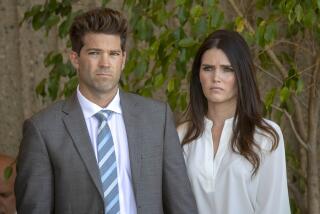Most convictions thrown out in Anna Nicole Smith drug trial
- Share via
A judge Thursday threw out all guilty verdicts except one misdemeanor conviction in the drug trial surrounding the death of model Anna Nicole Smith — criticizing a case authorities once heralded as a cautionary tale to doctors too liberal with their prescription pads.
Los Angeles County Superior Court Judge Robert Perry cleared Smith’s manager and companion Howard K. Stern of all convictions and dismissed two conspiracy counts for psychiatrist Khristine Eroshevich. Of the two remaining felony convictions for Eroshevich, involving obtaining medication under a false name, Perry tossed out one and reduced the other to a misdemeanor.
At the start of the trial, Stern, Eroshevich and Smith’s primary care physician, Sandeep Kapoor, had faced a total of 23 felony charges and what prosecutors said were hefty prison sentences.
Perry said the jury’s verdict, which acquitted Kapoor, the lead defendant, across the board, was “a stunning repudiation of the prosecution’s case.”
“No doubt, there are doctors who are nothing more than pill pushers,” Perry said. “This case did not involve such doctors.”
Perry found that Stern did not have the intention to defraud or mislead authorities when he helped get medication for Smith under aliases or under his own name, and could not be convicted of criminal conspiracy. The judge said he regretted not taking action earlier in the case, which he said was flawed because of prosecutors’ misunderstanding of conspiracy law.
Dist. Atty. Steve Cooley said in a statement shortly after Perry’s ruling that his office would “pursue all appellate remedies to overturn Judge Perry’s decision,” but did not say whether prosecutors would be seeking a retrial on counts on which the jury deadlocked.
“The jury deliberated more than two weeks and reached a fair and thorough verdict in accordance with the law and the evidence we were allowed to present,” Cooley said, adding that the judge’s ruling was “inconsistent” with his previous rulings and the trial.
Outside court, defendants and their attorneys accused prosecutors of trying to capitalize on the publicity that followed Smith’s 2007 death from an accidental overdose at the Seminole Hard Rock Hotel and Casino in Hollywood, Fla.
“A lot of this was done for publicity,” Stern said. “They didn’t care at what cost, they didn’t care whose lives they destroyed in the process.”
His attorney, Steve Sadow, noted the news conference that then-Atty. Gen. Jerry Brown held announcing the charges in 2009, saying, “I criticized him when he first opened his mouth about this case.”
Eroshevich’s attorney, Bradley Brunon, said the judge saw through the prosecution’s “misapplication of the law … lack of preparation and lack of foresight.”
In his lengthy ruling, Perry weighed in on what was a point of heated contention during the trial: whether Smith was addicted to the pain medication that ultimately led to her death. Prosecutors had initially charged the defendants with illegally prescribing to an addict without a medical purpose.
“I certainly believe she was not an addict under the law,” Perry said, adding that he was persuaded by the evidence that Smith was a patient suffering chronic pain that was not sufficiently controlled.
Perry also said he disagreed with the prosecutors’ portrayal of the doctors and Stern as reckless enablers, saying he believed Eroshevich acted with a “heartfelt desire to help” Smith and that Stern was trying to protect her privacy.
Noting the case of actress Farrah Fawcett, whose medical records were improperly accessed by hospital employees, Perry said there was a legitimate reason for using aliases on prescriptions for sensitive drugs.
“I accept in this media-driven society, there is an interest for celebrities to protect their privacy,” he said.
Eroshevich said she felt “redeemed.”
“I can admit my mistakes and move on,” she said.
Perry sentenced Eroshevich for the remaining misdemeanor count to one year summary probation and a $100 fine. Prosecutors had asked that she be sentenced to five years felony probation, 300 hours of community service and a $5,000 fine.
More to Read
Sign up for Essential California
The most important California stories and recommendations in your inbox every morning.
You may occasionally receive promotional content from the Los Angeles Times.











